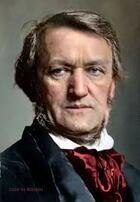
Wilhelm Richard Wagner (Leipzig, May 22, 1813 - Venice, February 13, 1883) was a composer, conductor, playwright, poet and music theorist, of whose destiny and channel he proclaimed himself a visionary.
Known above all for his operas, which he called "musical dramas", and for writing his own librettos with high literary ambition, he has left to the history of music such important operas as Rienzi (1842), The Flying Dutchman (1843), Tannhäuser (1845), Lohengrin (1850), the well-known tetralogy The Ring of the Nibelung (1848-1874), Tristan and Isolde (1865), The Master Singers of Nuremberg (1868) and Parsifal (1882), his last opera written especially for the Festspielhaus in Bayreuth, the opera house that he himself had built for the staging of his works.
But the Saxon composer was also a writer and he was obsessed with the music scene in Germany, supposedly in crisis for having abandoned itself to capitalist commercialization. From 1849 he began to develop the concept of Gesamtkunstwerk, the total work of art in which all artistic disciplines would meet and complement. Wagner begins to put these ideas into writing in Art and Revolution (1849), The work of art of the future (1849), Judaism in music (1850) and what is perhaps his most important essay, Opera and drama (1851) , whose ideas are reflected and materialized in the Ring cycle.




